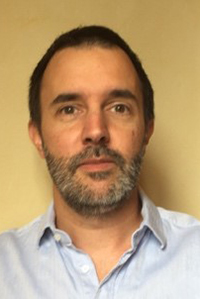Last March, we introduced French researcher Frédéric Padilla, PhD, as a 2017 Richard Merkin Scholar. Joining us from the Laboratory of Therapeutic Applications of Ultrasound (LabTAU) in Lyon, France, Frédéric signed on for a 12-month appointment as a Visiting Professor at the University of Virginia’s Department of Radiation Oncology while working closely with the Foundation’s scientific team. As he plans to continue his work with the Foundation, we recently sat down with Frédéric for an update on his experience thus far and his future work.
 Tell us about your research over the past year.
Tell us about your research over the past year.
I’ve been studying how focused ultrasound can trigger an immune response in breast cancer, using preclinical models. The objective is to understand which ultrasound modality will be the most effective to trigger an immune response and to improve the response to immunotherapy drugs.
With collaborators at UVa, I am helping to determine a treatment regimen combining focused ultrasound, chemotherapy and immunotherapy to alleviate the immunosuppressive microenvironment that tumors develop to protect themselves from the body’s immune system. We aim for this treatment to stimulate an effective immune response. The data that will come out of this ongoing project will help support clinical trials, such as the trial ongoing at UVa exploring breast cancer treatment with a combination of focused ultrasound and immunotherapy.
I have also been working on a technical project with the clinical Insightec Exablate Neuro device which is used for focused ultrasound brain treatments. The project is investigating whether changing treatment parameters would allow clinicians to increase the treatment envelope – the area of the brain that focused ultrasound can effectively target.
How long do you plan to continue working for the Foundation?
I plan to extend my visiting fellowship for an extra year and then transition to become a full-time biomedical engineer at the Foundation.
What future projects are you planning?
I’ve been planning for two new projects to start in the fall. The first one will investigate the potential of focused ultrasound to sensitize pancreatic tumors to immunotherapies. Pancreatic cancer is one of the most challenging cancers to treat, and I think focused ultrasound has an opportunity to become a best-in-class, noninvasive treatment strategy in combination with immunotherapies by triggering or promoting a therapeutic response.
The second project aims at promoting brain tumor response to radiosurgery–by combining radiosurgery with focused ultrasound – when treating diffuse tumors such as glioblastoma multiforme (GBM). These situations present an opportunity for focused ultrasound to be applied as an adjuvant treatment to augment the primary stereotactic radiosurgery response through radiosensitization of the target. The project will investigate whether a combined treatment of focused ultrasound plus radiosurgery can improve therapeutic outcome.
Along with Merkin Scholar Francesco Prada, MD, I also plan to study blood-brain barrier opening and its relation to microbubble distribution within the brain.
Share some thoughts on your experience at the Foundation.
I came to the Foundation to share my expertise in the biomedical engineering aspects of focused ultrasound and to broaden the scope of my experience, in particular for brain applications. The environment at the Foundation and the interactions with its collaborators, especially at UVa, have been extremely stimulating. I have had opportunities to make contact with leaders of the field and focus on projects that are clinically relevant.
